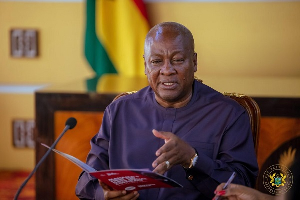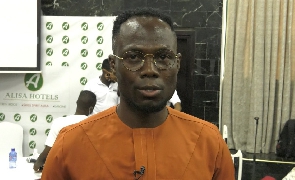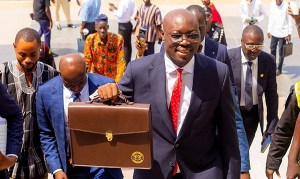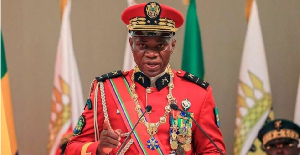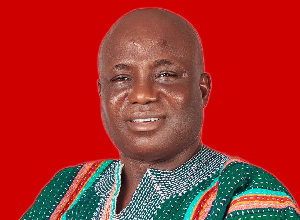The modern incarnation of the vampire myth seems to have largely stemmed from Gothic European literature of the 18th and 19th centuries, around the time when vampire hysteria was peaking in Europe.
Vampires are supposedly dead humans (originally suicides, heretics, or criminals) who maintain a kind of life by biting the necks of living humans and sucking their blood; their victims also become vampires after death.
These “undead” creatures cast no shadow and are not reflected in mirrors. They can be warded off by crucifixes or wreaths of garlic and can be killed by exposure to the sun or by an oak stake driven through the heart.
The most famous vampire is Count Dracula from Bram Stoker’s novel Dracula (1897).
Similarly, mining involves the extraction and digging of minerals from beneath the earth's surface.
To some extent, miners (both legal and illegal) have affected communities with their activities, extracting minerals with a no-holds-barred approach similar to that of a vampire.
Illegal mining has often been justified by the myth that it leads to economic development and improved quality of life.
The truth is far from this false narrative, promoted by those who choose profits over people and the planet.
In reality, illegal mining is quite simply the theft of natural resources, generating profit for a few whiles causing a staggering series of social, environmental, and health losses for many.
Africa is endowed with numerous natural resources, including gold, ore, copper, bauxite, manganese, and timber, among others.
As a result, Africa has gained global recognition in stock and exchange markets, with the continent touted as one of the richest and most mineral-endowed.
Formerly called the Gold Coast, Ghana is one of the biggest producers of gold in Africa and the world. Gold contributes significantly to Ghana’s economy, and small-scale mining is an important source of income for Ghanaian households, producing about 30 percent of Ghana’s total gold output.
Formal extractive companies do not offer much employment to local people, pushing them to seek employment through illegal mining practices, popularly known as ‘Galamsey’.
With so many Ghanaians practicing small-scale mining, the government felt the need to regulate mining practices to streamline the sector’s contribution to the economy, manage the use of resources by small-scale miners, and provide official marketing channels for the gold produced by the sector.
In 1989, the government passed the Small-Scale Gold Mining Act, which introduced a licensing process.
The influx of small-scale and illegal miners, mostly from China, has intensified illegal mining activities on the continent, with migrant miners abusing mining laws and practices.
Mining communities in Africa are experiencing numerous detrimental impacts environmentally, socially, and economically.
Unregulated and illegal mining by Chinese migrants has severely challenged the Ghanaian government, local communities, and rural populations.
It has compromised the local economy and security, particularly the well-being and safety of women.
In response, the government passed the 2006 Minerals and Mining Act, which “reserved” small-scale mining for Ghanaian citizens, and instituted the Alternative Livelihood and Community Mining Program, which sought to diversify sources of livelihood in mining areas.
Despite these government interventions and policies, skilled laborers, who were reportedly apprentices of some unlicensed foreign gold extractors, have been able to persuade local inhabitants to engage in illegal mining with consensual agreements to proportionally share the gains from the extracts. Should the surge of ‘Galamsey’ be a concern for the country?
In 2023, a scientific study carried out by the Central de Pueblos Indígenas de La Paz (CPILAP), together with the Universidad Mayor de San Andrés (UMSA), revealed that 75% of Indigenous Peoples in the Northern Amazon are poisoned with high levels of mercury.
In the most extreme cases, some individuals exceed 10 parts per million of mercury, nine times the level allowed by the World Health Organization (WHO). This level of exposure affects neurological development, causing tremors, memory loss, motor dysfunction, and headaches, and is dangerous for intrauterine development.
Although the impact in Ghana may not be as severe as this, it is imperative for Ghanaians to treat illegal mining with all seriousness to avert the looming danger.
Is Mining a Curse or Blessing?
In 2011, the mining industry contributed around 37% to the country's total exports, 38.3% of Ghana's total corporate tax, and 27.6% of government revenue (Ministry of Economy and Industry report, 2020).
Like other developing countries namely, Zambia, South Africa, and Mongolia, Ghana's mining sector is a pivotal asset for both micro and macroeconomic development.
In addition to gold mining, other natural resources like diamonds, bauxite, crude oil deposits, and timber have significantly contributed to economic growth and development (Worlanyo and Jiangfeng, 2020).
In 2018, Ghana surpassed South Africa to become the leading gold producer in Africa and one of the top 10 gold-producing countries in the world (Ministry of Economy and Industry (MEI), 2020).
Despite these achievements, many stakeholders have questioned the positive impacts of gold mining in contrast to its negative effects on farmers' economic growth and its environmental ramifications.
Samuel et al. (2012) argued that the negative impacts of mining on socioeconomic development outweigh its positive gains, especially in small-scale surface mining.
Mining has played a pivotal role in driving economic growth in Ghana.
The sector's contribution to the country's gross domestic product (GDP) has been significant, primarily through foreign exchange earnings, investments, and its linkages with other sectors of the economy.
The revenue generated from mining activities has been instrumental in supporting infrastructure development and investment in social services, which are vital for economic progress and societal well-being.
These investments have helped improve transportation networks, build schools and healthcare facilities, and enhance public utilities, among other developmental initiatives (World Bank, 2020; Aryee, 2016).
Furthermore, the mining sector has catalysed economic diversification and industrialization in Ghana. The industry's presence has stimulated the growth of associated sectors such as manufacturing, construction, and transportation.
This interdependence between mining and other sectors has created employment opportunities and contributed to overall economic expansion (Aryee, 2016).
Foreign exchange earnings from mining exports have also bolstered Ghana's economic growth.
The inflow of foreign currency enhances the country's international trade position, strengthens its balance of payments, and provides resources for the importation of goods and services that support various economic activities (World Bank, 2020).
Today, Ghana is able to trade gold for oil to promote cedi stabilization. The Gold for Oil (G4O) Programme is an initiative of the Government of Ghana to use the existing Bank of Ghana (BoG) Domestic Gold Purchase (DGP) Programme to support the import of petroleum products into Ghana.
The government has begun implementing the G4O Programme, where gold is purchased under the BoG’s DGP Programme mainly through the Precious Minerals and Marketing Company (PMMC) and, where required, from aggregators and mining firms is used to purchase petroleum products.
Mining activities in Ghana have been instrumental in generating employment opportunities, benefiting both the individuals directly involved in mining operations and those employed in various support services.
Direct employment in mining operations includes roles such as mine workers, engineers, geologists, and technicians. These positions provide job opportunities to skilled and semi-skilled workers, offering them a source of income and livelihood.
Mining companies also engage in Corporate Social Responsibility (CSR). CSR refers to the voluntary initiatives and actions undertaken by mining companies to contribute positively to society and address social and environmental challenges (Van Marrewijk, 2003).
CSR activities in the mining sector may include community development projects, environmental conservation efforts, and initiatives to promote transparency and accountability (Ofori & Hinson, 2014). Recently, Gold Fields commissioned a 10,000-seat TnA stadium as part of its commitment to giving back to the Tarkwa community.
Conversely, what seemed to be our economic gain now appears to be a nation-wrecker. The effects of illegal mining (Galamsey) in Ghana have been devastating over the last few years. Though small-scale mining was legalized in 1989 during the military regime of the People's National Defense Council (PNDC), it was intended primarily for local people.
However, some foreign nationals have conspired with citizens to illegally engage in gold mining. This method of gold mining is not properly carried out, adversely affecting the lands and water bodies around the extraction sites.
Although there has been an increase in the number of people entering the illegal mining business and applying new equipment and technology in their illegal activities, there has been little impact on the living conditions of citizens in these communities.
Rather, communities in mining areas have experienced declining standards of living and negative effects of mining, including loss of jobs, farmland, and water pollution.
In 2022, an observational study in Manso Nkwanta in the Ashanti Region and Bibiani in the Western Region, noted for its gold mining prowess, revealed that most of the converted mining sites used to be cocoa farms sold to miners for gold extraction.
“We don’t get anything from cocoa production, so we sell the farms to rich men who are willing to buy the sites for mining,” quoted a cocoa farmer.
It is interesting to note that these cocoa farmers are veteran cocoa producers, and the cultivation runs through family lineage. To their displeasure, most middlemen bought cocoa from the farmers on credit, with some even failing to fulfil their part of the bargain.
“They normally come to us to buy on credit with a deferred payment plan. Sometimes, the money delays, and other times it does not even come,” lamented a farmer who expressed dissatisfaction with the treatment from middlemen and cocoa buyers.
The respondent also disclosed that an acre of land in 2022 was sold for GH₵ 35,000, which Galamseyers were willing to pay.
The observation also revealed that these farmers, after selling their farms, relocated to different cities, and some even travelled to the Western world to seek greener pastures.
A source also revealed that most cocoa farms in Ghana have gold underneath, which can be exploited to generate significant income.
These findings raise many questions. Are our farmers getting value for money regarding the sale of cocoa? On the back of these findings, it is not surprising that there is a surge in cocoa smuggling in Ghana which is negatively affecting revenue generation.
This practice, however, violates the 2006 Minerals and Mining Act, which states that “Despite a right or title which a person may have to land in, upon or under which minerals are situated, a person shall not conduct activities on or over land in Ghana for the search, reconnaissance, prospecting, exploration, or mining for a mineral unless the person has been granted a mineral right in accordance with this Act.”
This clause under the Right to Engage in Mineral Extraction highlights that being a custodian of land does not automatically grant one the right to engage in mining activities; thus, one must formally apply for approval using the appropriate channels and satisfy all requirements.
The power dynamics between farmers, local chiefs, and the government are worth monitoring.
Most cocoa farmers do not see the need to apply for a license to engage in mining. The process has been described as highly bureaucratic, expensive, time-consuming, and riddled with corruption.
Only those with money and political connections can secure licenses, thus discouraging many Ghanaians without money and influence from applying for and obtaining legal licenses. Should the disregard for this Act be a concern for the government?
Notably, the mining activities undertaken are not conducted properly. As revealed by the interviewee, the wealthy in the community acquire lands from farmers and local inhabitants to engage in illegal mining. Most illegal miners do not have the requisite tools, such as gold nugget detectors, drilling machines, and excavators, to engage in mining.
As a result, they resort to lottery digging to unearth gold. Most of these pits are left uncovered, which eventually becomes a natural lake filled with dirt.
Unfortunately, after mining, these sites cease to be habitats and become death traps for citizens. This practice does not protect the land and environment, leaving them in a deplorable state.
The conversation revealed a sacred practice of sacrificing to pacify the lands in order to generate more gold. Similar to the story of the vampire, it is believed that gold demands blood; thus, after each sacrifice, they are able to extract more gold. Indeed, gold mining can be evil at times.
Visits to mining communities revealed the destructive nature of unregulated mining practices on land and water bodies. In Ghana, formerly major rivers like Tano, Pra, Ankobra, Oti, and Ofin have all turned into clayey, undrinkable waters and are gradually drying out.
What once served as heritage is now in a despicable state, with some rivers disappearing from sight. It is worth noting that the paradigm has shifted from land to water dredging.
The value of land has increased overtime, making it less affordable, and that has pushed the focus onto water bodies.
These illegal miners dredge and extract from water bodies, polluting them with toxic chemicals, making them unusable by communities. After extraction, they wash the gold in rivers without any precautionary measures.
Deadly is the rampant mercury contamination associated with mining. Used in gold mining, this toxic chemical element seeps into the water and accumulates throughout the food chain, contaminating water, plants, and lodging in the bodies of fish, animals, and humans.
These rivers and streams, which served as sources of water to support livelihoods, now resemble Lipton tea, while others can be described as chocolate drinks.
A country blessed with minerals and a youth forming the majority of its population should be able to groom and raise capable individuals to effectively extract these minerals. However, the lack of technical know-how has led to the influx of foreigners, predominantly Chinese miners into the country.
Is Ghana’s educational system solving or bridging the gap? Several reasons account for the influx of Chinese miners.
First, China’s economic liberalization has led many Chinese migrant workers to come to Africa for work in a range of industries. With its ample unprotected gold reserves, Ghana has proven attractive to Chinese gold diggers.
Second, the majority of the Chinese miners in Ghana come from the Guangxi autonomous region in China, a region with a long history of gold mining and expertise in advanced mining techniques.
Although some have gone through the appropriate channels to obtain licenses and approvals, others have engaged in illegal mining, exploiting loopholes in the system.
Unregulated and illegal mining by Chinese migrants has severely challenged the Ghanaian government, local communities, and rural populations.
It has compromised the local economy and security, particularly the well-being and security of women.
The Chinese have not only succeeded in illegal mining, but they have also established relationships with women in these mining areas, and by mutual concession, the community has accepted them as part of their society.
There are constant communal conflicts in mining communities between the mining operators and the local people, who feel they are not protected by state institutions.
In 2022, nearly 60 tonnes of gold were reportedly smuggled out of Ghana, further amplifying financial losses.
The UK has warned that if the issue is not addressed, the combination of unregulated mining and illegal small-scale mining, known locally as “galamsey,” could have long-term detrimental effects on Ghana’s economic stability.
“This is all lost revenue to the government of Ghana. At the moment, the sector is vulnerable. It is being exploited by organized crime groups.
The threats are growing. The gold smuggling has more than doubled. We want to disrupt illegal mining and illicit financial inflows.
Ghana loses more than $2 billion yearly to gold smuggling,” said Chris Aston, team lead for the UK-Ghana Gold Programme (UKGGP), during a meeting with civil society organizations and political parties on mining reforms and governance.
The UK-Ghana Gold Programme works in collaboration with Ghanaian authorities to regulate artisanal mining, aiming to ensure that existing regulations are properly enforced.
The UK government sees urgent action as critical to protecting Ghana’s future, both economically and environmentally.
Aston stressed that reversing the trend of gold smuggling is essential to stabilizing the country's revenue flow and safeguarding the livelihoods of those involved in legal mining operations.
“This issue, if left unchecked, will continue to damage Ghana’s economy and environment. Strong enforcement is needed to address the growing illegal activities in the gold mining sector,” Aston is quoted as saying.
Is the evidence not glaring enough? It looks as though the Westerners are crying more than the bereaved.
Borrowing the words of the incumbent President of the Republic of Ghana, His Excellency Nana Akufo-Addo, “We have to be citizens and not spectators.”
This is a call to action for Ghanaians to protect their heritage.
Government Intervention
The government has attempted to combat the surge in illegal mining, “Galamsey,” through various means.
In recent years, the Ghanaian government has emphasized the need for responsible and sustainable mining practices.
Efforts have been made to promote environmental protection, community development, and corporate social responsibility within the mining sector.
This includes initiatives to ensure the fair distribution of mining revenues, mitigate the environmental impact of mining activities, and foster positive social outcomes for local communities.
However, the government’s approach to galamsey has been met with mixed reactions. Some have labelled the approach as lackadaisical and superficial. In 2017, there was a ban imposed on all ASM (Artisanal and Small-scale Mining) activities between April 2017 and December 2018.
To enforce this ban, the government instituted and empowered security personnel drawn from the military and police services, which was named Operation Vanguard.
An Inter-Ministerial Committee against Illegal Mining (IMCIM) was established at both the national and mining district levels.
An immediate reaction was the seizure of some excavators at mining sites and the brutalizing of perpetrators. Unfortunately, this mitigating action was politicized, as some opposition party members blamed the incumbent government for targeting its people.
Fast forward to 2019, renowned Ghanaian undercover journalist Anas Aremeyaw Anas, in his ‘Galamsey Economy’ expose, revealed the corruption in Ghana’s mining rights acquisition process.
Charles Cromwell Nanabayin Onuawonto Bissue, who was then the presidential staffer and secretary to the Inter-Ministerial Committee on Illegal Mining (IMCIM), was implicated for engaging in corrupt activities in the fight against illegal mining, which eventually led to him stepping down from his role.
He was captured on tape receiving wads of cash to facilitate the speedy clearance of a mining company to commence operations.
In a similar fashion, Adu Boahen, the then Minister of State for Finance, was sacked in 2022 following an expose that allegedly revealed his involvement in illegal mining. The matter was referred to the special prosecutor.
Anas alleged that Boahen had taken bribes from artisanal mine investors to allow them to operate unimpeded. Notably among the apprehended culprits was Aisha Huang, known as the “Galamsey Queen” for running a massive illegal mining operation in Ghana.
She was sentenced to four and a half years in prison and also fined $4,000 by the Accra High Court.
Are these precedents and punishments severe enough to deter others from indulging in illegal mining?
The emergence of the Minerals and Mining Act, 2006 (Act 700), which sought to regulate mining operations, has fallen short of its goals.
It turns out that individuals entrusted with supervising the regularisation process have abused their office, turning mining into a cash crop.
Today, Ghana faces an imposing threat of losing its water bodies to illegal mining. Residents near mining sites hardly have access to quality water.
As a basic need, water is now scarce in some towns, leaving them with little or no option but to settle for polluted water.
The Ghana Water Company has warned that it may not be able to purify pipe-borne water due to the continuous pollution of water bodies with mercury by the miners.
The Ghana Health Sector has also cautioned against the outbreak of diseases as a result of illegal mining. These indicators pose a threat to environmental sustainability and the ecosystem.
The insatiable desire to become rich and the quest for gold is grossly undermining the livelihoods of many.
Ghana is losing significant forest reserves and plantations to ‘galamsey.’ Sites that once served as tourist attractions are no longer viable due to illegal mining.
Communities are being forced to relocate, piling pressure on urban cities and capitals. Deforestation has caused sudden climate change, leading farmers to warn against food shortages as expected rains have not materialized.
The sorry state of some water bodies has led to a public outcry from several individuals and organizations. Must it take pressure groups and essential service providers in the country to force the government to act? This is a national crisis and must be treated as a state of emergency.
Way Forward
Attitudinal Adjustment: The greatest discovery of any generation is that a human being can alter his life by altering his attitude – William James.
Citizens are quick to finger government officials for their predicament but often do not see themselves as the cause of their woes.
It is interesting to note that individuals who indulge in illegal mining are primarily ordinary citizens who do not hold any public office.
During interviews with some cocoa farmers, they revealed that the government cannot stop them from mining on their lands.
“It is my land, and the government cannot dictate to me what to do with it.” With this adamant posture, it is clear these individuals are not privy to the Minerals and Mining Act, thus they ignore its provisions and operate independently.
Additionally, citizens sell their lands to foreigners and contribute to the smuggling of gold, which has skyrocketed in Ghana.
What happens if citizens refuse to sell their lands to foreigners? What if they report incidents of smuggling and illegal mining?
What if custodians of the land seek the appropriate licenses before engaging in mining? While immediate outcomes may not be evident, these attitudinal changes could preserve our lands and water bodies.
Institutional Reforms: It appears that citizens have lost trust in the government when it comes to tackling galamsey. There is an urgent need for institutional reforms to regain this trust.
Issues of illegal mining should be addressed without a political lens. The partisan approach to national issues must be halted.
Allegations suggest that security personnel posted to sites to curb illegal mining often become accomplices to the act. There should be a reorientation for security personnel deployed to these mining sites, and periodic rotations of personnel should be encouraged to eliminate familiarity with local inhabitants.
Also, it imperative to improve remunerations given to these personnel to avert instances of comprising what is right.
Government officials entrusted with supervising and serving on commissions should possess a high level of moral consciousness and demonstrate integrity throughout their tenure.
Some task force officials and local police accept bribes to “look the other way,” thereby benefiting from illegal mining.
Chinese miners reportedly boast about their “good working relationships” with local police. Indeed, Chinese miners who are caught and detained are often released after paying fines and are then free to resume their illegal activities.
The lack of transparency in law enforcement regarding who is arrested and released complicates civil society efforts to protest or counter illegal mining.
On occasion, prosecutions of Chinese miners have been halted without reasonable justification, and their seized equipment has been returned to them.
From Anas’s expose, it is evident that many government officials captured on tape failed the integrity test and succumbed to the lure of money in exchange for granting mining access without due diligence.
Licenses should be issued based on merit when applicants meet all requirements stipulated in the 2006 Minerals and Mining Act.
Amendment of the 2006 Minerals and Mining Act: The provisions of the Act seem to have side-lined the role of traditional rulers in acquiring land and licenses for operations.
Traditional rulers play significant roles in our communities and must be involved in the fight against illegal mining. Furthermore, without strict punitive measures against illegal activities in the extractive industry, the sector will continue to be a curse to Ghana. Ghana could consider reviewing and revamping its mining policies.
The government and policymakers should equip regulatory institutions and law enforcement agencies with the necessary materials, including financial support, human capital, and modern equipment to effectively track, apprehend, and take action against companies that breach mining regulations.
Similar to Peru's Law 30425, known as the ‘Law to Prevent and Combat Illegal Mining,’ which prescribes severe penalties for illegal miners and has successfully reduced illegal mining by 40%, Ghana could adopt a similar approach and treat illegal mining as a serious offense.
Role of Civil Society: Civil society can play a crucial role in addressing the adverse effects of ‘galamsey’. Civil Society Organizations (CSOs) are particularly important in raising awareness within communities, curbing violence, protecting women, and pressuring the government for accountability and transparency.
The government can partner with USAID to support environmental education and inform the public and policymakers about the impacts of illegal gold mining. USAID can help strengthen local scientific capacity to analyse these impacts.
In collaboration with Peruvian and U.S. researchers, USAID has established the first Mercury and Analytical Chemistry Analysis Laboratory in Madre de Dios, utilized drones to analyse deforestation and reforestation, and expanded research on the effects of illegal mining in that region. Ghana can benefit from such partnerships with USAID.
Creation of More Employment Opportunities/Alternative livelihood Programmes: Some individuals attribute their involvement in illegal mining to unemployment.
The National Youth Employment Programme should be reviewed alongside wage structures. Equal employment opportunities should be made available across the country to reduce the number of people involved in illegal mining.
Also, to reduce dependency on illegal mining, the government and NGOs can introduce alternative livelihood programs that offer training and resources for sustainable agricultural practices, artisanal crafts, and eco-tourism.
These programmes can help create sustainable income opportunities while preserving the environment.
Community Engagement and Empowerment:
Empowering local communities to take ownership of their land and resources is crucial.
Community engagement initiatives can involve local leaders, farmers, and youth in discussions about the sustainable use of natural resources.
Establishing community watchdog groups can help monitor and report illegal mining activities, creating a sense of collective responsibility.
Improved Monitoring and Surveillance:
The government should invest in modern technology, such as satellite imagery and drones, to monitor illegal mining activities in real time. Enhanced surveillance can help law enforcement agencies track illegal operations and respond more swiftly.
Conclusion
The "Galamsey" activities have turned drinking water into clayey water and destroyed arable lands and forest reserves.
It is therefore not surprising that most farmers have defected from their farming and joined the "Galamsey" business. There is food insecurity in the mining communities, to the extent that food is being imported from other cities.
Food insecurity and the loss of bodies of water will continue if proper extractive regulations are not formulated and if existing regulations are not enforced.
The government’s ban on illegal mining and violent crackdowns are compounding the problem while failing to tackle it systematically.
The problem of Chinese illegal mining in Ghana is both serious and complicated. It secures livelihoods for some and destroys it for others.
It creates dependencies, incites violence, reduces security, and severely depletes natural resources.
By virtue of who we are, Ghanaians, we must uphold the spirit of our National Pledge, which calls upon us to “serve our nation, Ghana, with all our strength., to hold in high esteem our heritage, won for us through the blood and toil of our fathers.” Ghana must tackle illegal mining with a united front devoid of political interference.
References.
1.Encyclopaedia Britannica. (n.d.). Vampire. Britannica. https://www.britannica.com/summary/vampire
2.Greenpeace International. (2021, April 27). Illegal mining in the Amazon: What you need to know. Greenpeace.
https://www.greenpeace.org/international/story/59123/amazon-rainforest-mining-illegal/
3.Government of Ghana. (2006). Minerals and Mining Act 703. Natural Resource Governance Institute.
https://resourcegovernance.org/sites/default/files/Minerals%20and%20Mining%20Act%20703%20Ghana.pdf
4.IntelliNews. (2023). UK urges Ghana to combat gold smuggling as $2bn in revenue is lost annually. IntelliNews. https://www.intellinews.com/uk-urges-ghana-to-combat-gold-smuggling-as-2bn-in-revenue-is-lost-annually-345357/
5.International Work Group for Indigenous Affairs (IWGIA). (2023). A halt on illegal mining in Bolivia. IWGIA. https://www.iwgia.org/en/news/5536-a-halt-on-illegal-mining-in-bolivia.html
6.Mensah, J. (2019). Galamsey in Ghana: Mitigating its negative effects. Women In International Security. https://wiisglobal.org/wp-content/uploads/Galamsey-in-Ghana-Mitigating-its-Negative-Effects.pdf
7.MyJoyOnline. (2023). All you need to know about the gold for oil programme. https://www.myjoyonline.com/all-you-need-to-know-about-the-gold-for-oil-programme/
8.USAID. (n.d.). Illegal gold mining (2017-2020). USAID. https://2017-2020.usaid.gov/peru/our-work/illegal-gold-mining
9.Wilson Center. (2021, February 9). Uncontrolled and illegal galamsey mining activities in Africa: An increasing threat to water and food security. Wilson Center. https://www.wilsoncenter.org/blog-post/uncontrolled-and-illegal-galamsey-mining-activities-in-africa-an-increasing-threat-to-water-and-food-security
10.Worlanyo, A. S., Alhassan, S. I., & Jiangfeng, L. (2022). The impacts of gold mining on the welfare of local farmers in Asutifi-North District in Ghana: A quantitative and multi-dimensional approach. Resources Policy, 75, 102458. https://doi.org/10.1016/j.resourpol.2021.102458
11.Yeboah, S., & Nyarkoh, B. J. (2022). The impact of mining on the Ghanaian economy: A comprehensive review (1992-2020). Munich Personal RePEc Archive. https://mpra.ub.uni-muenchen.de/117502/1/The%20Impact%20of%20Mining%20on%20the%20Ghanaian%20Economy%20MPRA.pdf
12.Zhang, L., Zhang, Z., & Wen, Z. (2023). Global mapping of resource extraction-induced environmental conflicts and their geographies. Environmental Development, 47, Article 100831.
Opinions of Thursday, 3 October 2024
Columnist: Ferdinand Adjei



